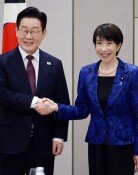Profitable Corporate Bonds Cannot Get Any Better Amid Low Interest Rates
Profitable Corporate Bonds Cannot Get Any Better Amid Low Interest Rates
Posted June. 13, 2005 06:29,
A-Ju Metal Co., a car casting manufacturer, issued non-guaranteed corporate bonds worth 30 billion won under the condition that it would return the principal with a 4.9 percent annual interest rate after three years.
Credit rating companies had given grade BBB0 to the bonds. Then, the official interest rate of BBB0 grade bonds was 6.59 percent, but A-Ju Metal managed to issue their bonds at 1.69 percent-lower interest rates.
With the collected capital, the firm paid back in full 20 billion won in loans borrowed from National Federation of Fisheries Cooperatives on April 22, this year at an annual 7.5 percent interest rate. This has saved the company more than 500 million won per year.
The time has come when companies can have a big say only if they have decent credit ratings.
Companies Hit the Jackpot-
Kukje Machinery, a farm machinery maker, issued BBB- grade corporate bonds worth 15 billion won last month. The interest rate was an annual 6.41 percent, which was 1.80 percentage points lower than the official rate (8.21 percent annually) announced by the Korea Securities Dealers Association.
The company, with the raised money, bought back all of the corporate bonds issued three years ago at an annual rate of 11.85 percent.
This low interest rate serves as a golden opportunity to improve ones balance sheet by refinancing high-interest rate corporate bonds as well as bank loans, said a staff with the finance team at Kukje Machinery.
Hyundai Oilbank Corporation also decided to refinance its high rate, annual 9.04 percent corporate bonds issued in 2002 by issuing corporate bonds of 100 billion won at an annual rate of 4.23 percent recently.
The firm, in its report on securities issuance performance submitted to the Financial Supervisory Board, stated, Analyzing interest rate trends to reduce financial costs, we concluded the recent downward trend of interest rates is a good opportunity and issued bonds earlier than planned.
These days, we have to beg companies that intend to repay loans to extend their payments a little longer or pay back just a portion, a corporate banking general manager with a commercial bank confessed.
Ultra-Popular Corporate Bonds with Low Rates, Individual Investors Also Interested-
The dip in corporate bond rates (increase in bond prices) has occurred as demand exceeds supply. In addition, the fundamental reason for chronic over-demand of corporate bonds in the bond market must be found from low interest rates.
This is because the Credit Union Federation of Korea or the Korean Federation of Community Credit Cooperative, that had used high interest rates scrambled to the bond market for investment, and even individuals who are not satisfied with the annual mid-three percent rate are taking interest in corporate bonds.
A few small and medium sized securities firms are gaining decent profits by selling OTC corporate bonds from a couple of years ago, and the high-risk and high-rate second-tier corporate bonds are popular, said Director Han Sang-hyun with the corporate finance team at Dongbu Securities.
The sale of OTC corporate bonds refers to a method to gain profits through which securities firms buy corporate bonds for an annual rate of eight percent wholesale and split up the bonds into small denominations to resell them at an annual seven percent rate. As the number of securities companies taking advantage of such sale strategies increases, the volume of the OTC corporate bond market is estimated to have increased to some 10 trillion won.
Accordingly, the official rate of BBB- grade corporate bonds with three-year maturity terms has dropped from early last years annual 10 percent rate to the early-eight percent range recently, and corporate bonds of blue chip companies will particularly see their interest rates stabilize at a far lower rate than the official one.
Director Han said, A high-risk, high-yield market has been created due to low interest rates. Even though there can be side effects such as bond prices jumping excessively compared to the base value of the company, there also are upsides such as reducing financing costs for companies and providing capital management tools for consumers.
Short-term CPs on Downward Trend-
In contrast, the commercial papers (CP) with a maturity of three months are stagnant. As the means to finance at low rates over a long time increases, companies no longer feel the need to issue CPs.
The Bank of Korea (BOK) estimates that the net worth of CPs issued by securities firms and merchant banks, excluding repaid value, stands at 500 billion won.
According to the BOK, repayment value far exceeded CP issuance counterparts for private companies as the amount mentioned above includes CP issuance values of state-run companies such as the purchase costs of non-performing loans (400 billion won) by Korea Asset Management Corporation and land compensation (300 billion won) related to Cheonggye Stream restoration project by SH Corporation (formerly known as Seoul Metropolitan Development Corp.).
Companies are increasingly converting short-term loans to long-term ones and give up issuing CPs even if they want to because investors may get the wrong impression that the firm is experiencing bad financial conditions, said an official with a commercial bank.
Korea Ratings estimated that the number of CP ratings fell from 248 in 2002 to 210 last year. This years figure stood at a mere 75 as of June 8.
Kyung-Joon Chung Ji-Wan Cha news91@donga.com cha@donga.com




![[속보]美 “미국인은 이란 당장 떠나라” 대사관 긴급 공지](https://dimg.donga.com/c/138/175/90/1/wps/NEWS/IMAGE/2026/01/13/133147285.1.jpg)


